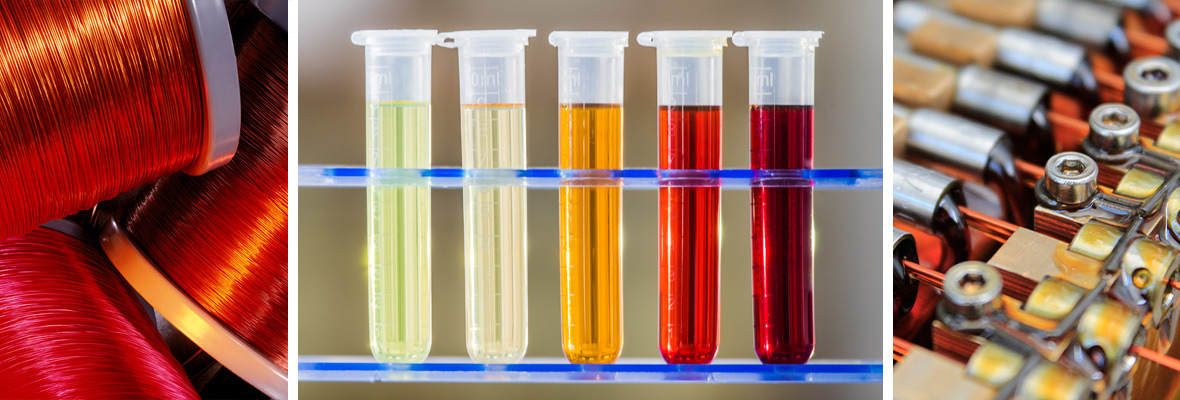Enamels are varnishes coated on the surface of copper or alumina wires and cured to form electrical insulation film possessing certain mechanical strength, thermal resistant and chemical resistant properties. The following includes some common types of enamel at Tianjin Ruiyuan.
Polyvinylformal
Polyvinylformal resin is one of the oldest synthetic paints, dating back to 1940. Usually branded as FORVAR (formerly produced by Monsanto company and now produced by Chisso), it is a polycondensation product of formaldehyde and hydrolyzed polyvinyl acetate. PVF is relatively soft and has poor solvent resistance. However, it can achieve better performance when used in conjunction with phenolic resin, melamine formaldehyde resin or polyisocyanate resin.
Polyurethane
Polyurethane was developed in Germany in the late 1940s. Originally, the heat level was between 105°C and 130°C, but now it has been improved to 180℃, and better performance. It is widely used in low-voltage electrical products such as precision coils, motors, instruments, household appliances, etc. due to its excellent dyeing, high coating rate and straight solderability.
PU wire can be soldered without stripping the coating.
Polyamide
Also names as nylon, it is commonly used as topcoat and can can improve lubricating, the physical and mechanical properties of PVF, PU and PE enamel. Polyamide can be used as solutions of simple fiber or broken fragment polymers. The solid contents of molecular of this polymer allows the solution to have a higher viscosity at a lower solids content.
Polyester
Good mechanical strength, paint film adhesion, excellent electrical, chemical resistance, thermal stability and solvent resistance; used in electronic communication lighting coils, sealed submersible motors, micro-generators, heat-resistance transformers, contactors, electromagnetic valve. The simplest polyester enamel is the reaction product of terephthalic acid, glycerin and ethylene glycol which is a typical composition of a 155°C grade polyester enamel. (While the heat life of these paints exceeds 180, other properties such as heat shock are closer to 155°C, unless the surface is then coated with nylon).
Polyesterimide
Solderable polyesterimide wire enamels are widely used on magnet wires for relays, small transformers, small motors, contactors, ignition coils, magnetic coils and automotive coils. These coatings are particularly well-suited in small electrical motors to connect the windings to the collector. The coated magnet wires have good elasticity as well as good dielectric and mechanical properties. It has excellent chemical properties, good heat resistance and resistance to refrigerants.
Polyamide-imide
Polyamide-imide wire enamels can be used either as dual or single coat, but both options deliver excellent mechanical properties, chemical resistance, high heat resistance, high tensile strength and fatigue resistance.
Polyimide
Temperature Rating: 240C
PI was commercialized by DuPont in the 1960s. It is the highest temperature-grade organic coating. Applied in the form of a polyamic acid solution, converted with heat to a continuous film. Possessing excellent thermal stability, resistant to radiation, chemicals and cryogenic temperatures. Cut trough >500℃.
Self-adhesive Enamel
Depending on the customer’s diverse production needs, it has different characteristics and a wide range of applications. Tianjin Ruiyuan uses self-bonding enamels that are based on epoxy, polyvinyl-butyral and polyamide are used to stabilize the winding. They are mainly used to coat instrument coils, voice coils, loudspeakers, small motors and sensors.
All magnet wires can be made to order by customers’ requirements, Tianjin Ruiyuan, your professional magnet wire solutions provider. Please feel free to contact us if you have any questions.
Post time: May-19-2023

